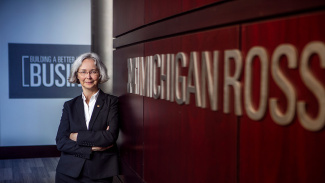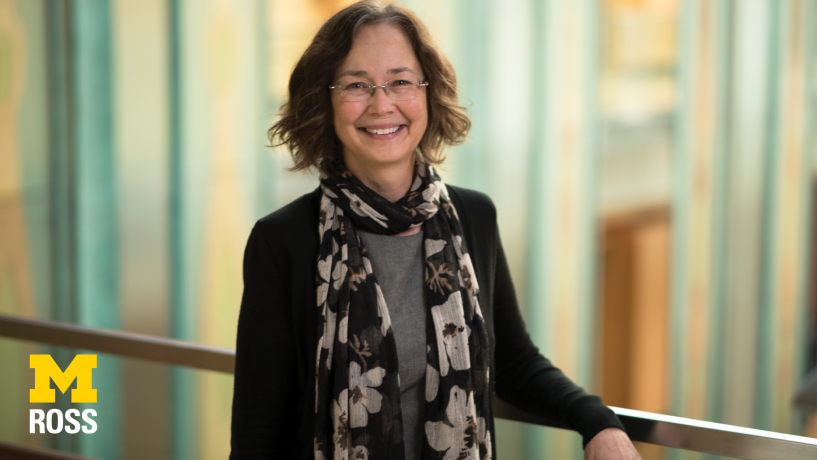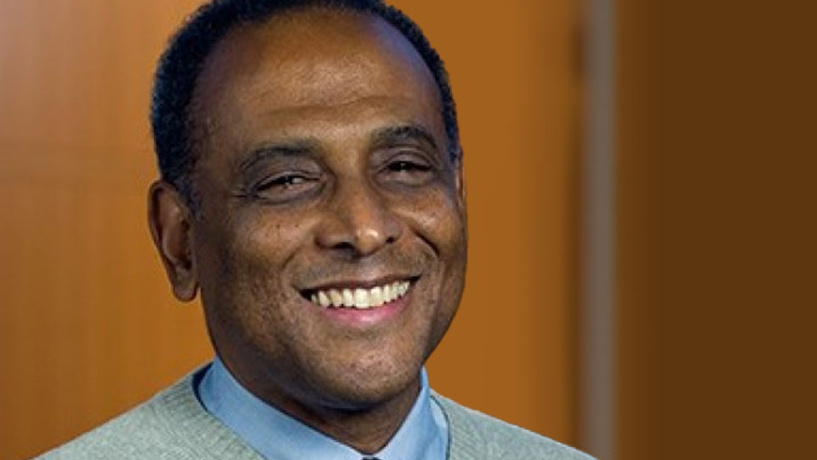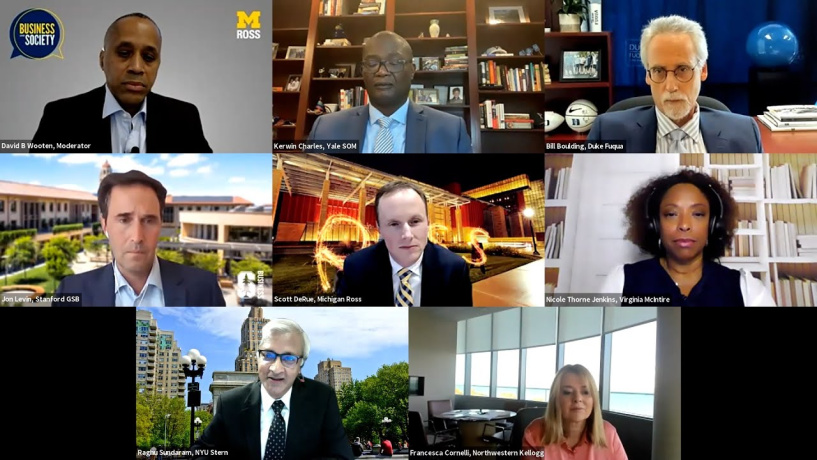Getting to Know the New Michigan Ross Interim Dean

Francine Lafontaine — who was appointed interim dean of the Ross School of Business on May 24 — is no stranger to the school. In fact, she has been part of the Michigan Ross community for three decades.
In that time, Dean Lafontaine has taken on many roles and responsibilities as a faculty member, researcher, and administrator at Michigan Ross. Most recently, she served as associate dean for Business+Impact, after several years in her role as senior associate dean for faculty and research. She also took a leave from the University of Michigan and Michigan Ross a few years ago to serve as the director of the Bureau of Economics at the U.S. Federal Trade Commission.
In addition to her interim dean title, she is currently the William Davidson Professor of Business Administration and professor of business economics and public policy. She also holds a courtesy appointment in the economics department in U-M’s College of Literature, Science, and the Arts.
For those who know Dean Lafontaine and those who are just being introduced, there is much to learn about this distinguished scholar and educator. Below, she answers questions about being a part of the Michigan Ross community, her thoughts on the future of business education, and more.
What is your favorite part of being a member of the Michigan Ross community?
My favorite part of being a member of the Michigan Ross community is being able to work with creative and smart colleagues and students, and continuing to learn and try new things every day. It’s also wonderful to watch others do the same, namely to see students, faculty, and staff continuously challenge themselves and develop new skills and insights. One of the amazing things about the U-M is being able to connect with global experts on almost any topic you can think of. Seeing people take advantage of this smorgasbord of opportunities during their time here, and then go on to achieve amazing things in their lives and careers, is without a doubt the most rewarding thing about being a professor at Ross. In addition, the other great thing is that our alumni come back to share with us and the community the things they learn and do, and give their time to the next generation, too."
What excites you the most about the future of business education?
Business is central to the way economic activity is organized and how well the economy performs. I believe, as my predecessor did, that business itself is the most powerful force for positive change around the world, and that it remains the path to greater economic prosperity and social mobility as well. Business education has the ability to give people the tools they need to make the best possible decisions for themselves, the organizations that they work for, and the communities they live in.
This is why we need the highest quality business education we can provide to be available to a large and diverse student body. This is what we strive for at Michigan Ross. We also need these future business leaders to think broadly about the impact of economic activity and to pay more attention to sustainability and societal well-being. In my role as associate dean for Business+Impact at Ross in recent times, it was particularly exciting to see how we are connecting business education with social impact, including focusing attention on big and important issues such as the United Nations’ Sustainable Development Goals via research and other initiatives throughout the school.
In the end, being at Michigan Ross, and seeing the energy with which our students are willing and able to take on the challenges they face personally and those they see in the world around them, makes me an optimist for the future. And, in fact, this optimism is another thing I truly value about being a part of the Ross community.
What are you most looking forward to in this new role?
I am looking forward to moving the school beyond the pandemic and thinking about what we have learned and how we can build on those experiences. COVID challenged all of us in various ways. For Michigan Ross, that meant thinking about new ways to educate our students when they can't all be in the same room, and also how to bring content into the classroom in innovative ways. As a school, I think we all are excited to draw on these lessons to address important next steps, namely create a more sustainable approach to business education, and extend our reach to new communities of learners.
What is your proudest accomplishment at Michigan Ross and why?
I was thrilled that I was able to bring my scholarly research at Ross to help shape policy and enforcement at the U.S. Federal Trade Commission during my leave there in 2014-15. Antitrust policy was a relatively quiet domain of expertise until relatively recently, but one that has had and continues to have considerable impact on the functioning of markets in the U.S. and the world. In recent times, it has become the subject of much political debate. Commentators on both the left and the right have suggested that we leave behind the consumer welfare and economic efficiency criteria that have been the hallmark of antitrust enforcement for several decades and return instead to the anti-bigness policy regime that characterized the early days of antitrust policy. There is much that is troublesome about this approach to antitrust, and business schools such as Ross are an indispensable source of research-based insights to inform related policy debates.
How will you continue on the mission of Ross to build a better world through business as interim dean?
It is my view that an interim dean’s job is to provide both stability and continuity while the school and the university search for the next permanent dean. After a year and a half of pandemic, it is particularly important that we refocus our efforts on continuing to deliver on our mission to build a better world through business. This, of course, includes making sure we provide the best possible educational experiences to our students, and that we use our resources to support the kind of powerful idea generation that sustains our community and will allow the school to continue to thrive.
What is your most cherished U-M/Ross tradition?
Commencement. It is just really wonderful to see the pride of family members that have supported their students, the pride of the students themselves as they realize all they have accomplished, and the promise that all the new graduates hold as they start on their new paths post-graduation. It is wonderful to be a part of such a celebration every year, and get to congratulate the next group of individuals to build our future.
What is a fun fact that most people don’t know about you?
My husband and I met and started dating back in high school. We have been together ever since, thanks to his willingness to accompany me on my moves from Montréal to Vancouver for grad school at the University of British Columbia, then to Carnegie Mellon, where I started my teaching career; and then to Ann Arbor and to the various places I have had the opportunity to visit for sabbaticals and so on.
I also am one of those few people in North America who does not drive. I did get my driver’s license eons ago, but did not like driving. My husband liked it — so to an economist like me, that made for a great division-of-labor opportunity. We own only one car, and I walk to the office every day, rain or shine, winter or summer.
What is your go-to spot at Michigan Ross and around Ann Arbor?
I like to stop by the Starbucks in the morning at Ross, and see the energy in the Winter Garden. Pretty much at every visit there, I get to say hi to a few people that I would not see that day otherwise. I appreciate these quick opportunities to stay connected.
In Ann Arbor, my husband and I consider the whole of central campus to be our regular go-to place; we walk through campus most days on our way to and from downtown. As for our destination on these walks, it is usually to some of our favorite restaurants, which include Mani Osteria and Café Zola. If you see us walking around campus, don’t be surprised — we still hold hands when walking together, just like we did in high school, even after all these years.
What do you like to do in your free time?
I mostly focus on my family. This means first and foremost spending time with my husband, and when I can travel to Los Angeles, my daughter, who I am very proud to say is working on her post-doc in computational biology at UCLA. The rest of our family members still all live in Montréal, Canada, where I am from, so we also travel there regularly. In Ann Arbor, I like to meet with friends over dinner or brunch. I also enjoy gardening when I can.
What advice do you have for current/prospective students?
Always do your best, and focus on pursuing those things that make you happy. That said, don’t forget that others will be impacted by the choices you make.







